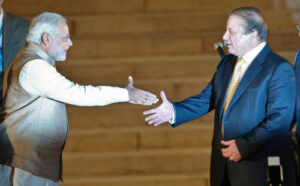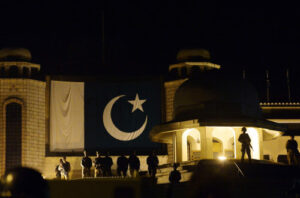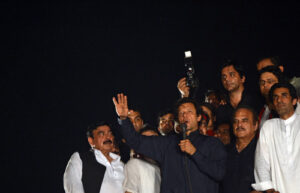The liberal criticism of Narendra Modi’s move to call off foreign secretary level talks with Pakistan may have completely missed the point. With the ‘Azadi’ and ‘Inqalabi’ marchers, owing allegiance to Imran Khan and Tahirul Qadri, sitting in outside Parliament House in Islamabad and Nawaz Sharif increasingly looking like a prisoner in his own capital, the prime minister may be having a quiet chuckle.
The usual argument against calling off the talks is that Modi may have played into the hands of hardline elements in the Pakistani establishment who were trying to ratchet up tensions and this move leaves his masterly outreach to Nawaz Sharif at his swearing-in ceremony in tatters. Idealistic goals guide all diplomacy but the fact is that realpolitik dictates its daily cut and thrust.

Even if foreign secretary Sujatha Singh would have gone to Pakistan, where would she have held the talks? At a time when the Pakistan Army has just moved in to take over security of the ‘red zone’ in Islamabad and the general commanding the Inter Services Press Relations Directorate has been reduced to issuing tweets for calm, saying that the ‘red zone’ must be protected because “important symbols of the state and the military”, holding meaningful talks on normalising relations would have been akin to living in cuckoo-land.

With Tahirul Qadri leading the move for an ‘Awami Parliament’ (People’s Parliament) outside Islamabad’s Parliament House and the rabble-rousing Imran Khan taunting the elected prime minister with cricketing analogies like “Nawaz Sharif! this is last over, you cannot win the match”, can anyone expect that talks with India would have had Sharif’s full attention, even if he had the decision-making leeway.
Nawaz Sharif is under siege and powered by the mob, Imran is now threatening to enter PM’s house if he does not resign. The fact is that the democratic wave that swept Nawaz Sharif back to power in 2013 is now exhausted and events this week show that the Pakistani prime minister is barely managing to cling on. The army is wisely not intervening directly because it cannot afford to, though there is enough talk about its tacit support for the opposition marches.

In such a scenario, Modi, an instinctive politician with sharper political antennae and native intelligence than most, seems to have played his cards well. By first extending his hand to Nawaz Sharif he made a political statement that he may not be the terrible Hindu ogre that most Pakistanis thought he would be. He then couched his outreach as essential for economic development. But when push came to shove, he signalled a hard fist within a velvet glove signalling that unnecessary needling through unprovoked firing on the LoC and meeting Hurriyat leaders in Delhi won’t be acceptable.
Modi is setting a political framework within which talks can move forward and he is also waiting for the Jammu and Kashmir elections early next year. Another free election will make his hand stronger and with Pakistan engulfed in its internal turmoil, its political establishment is not in a position to really do meaningful talks anyway.
Modi is being pragmatic and he may got this one right.

